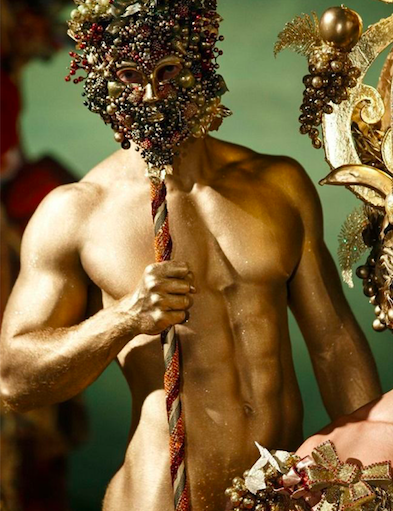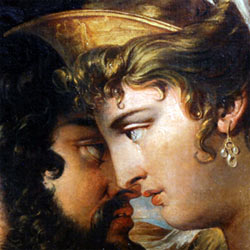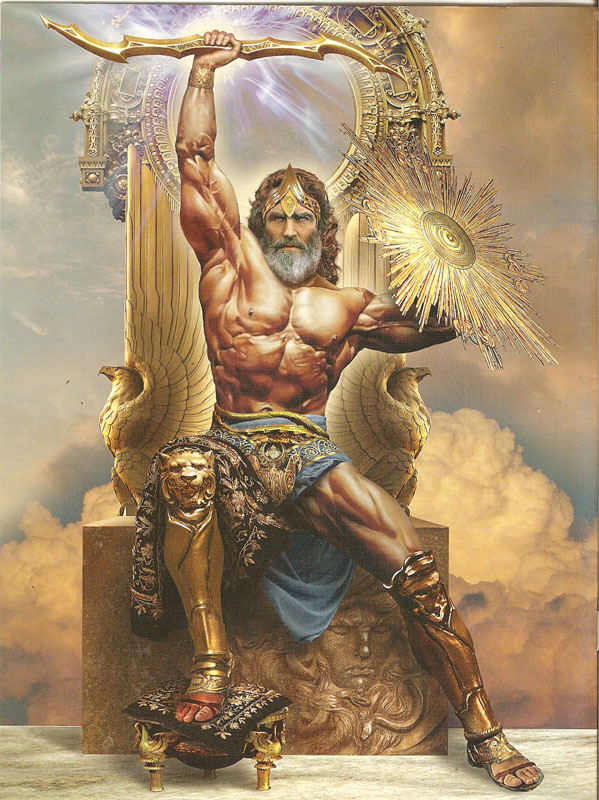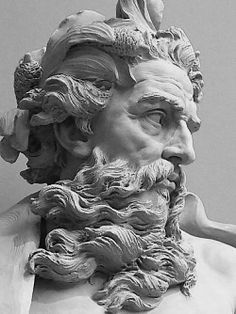
GOING ON NOW THROUGH OCTOBER 15
But don’t wait… Go find yourself a new fav right now!

GOING ON NOW THROUGH OCTOBER 15
But don’t wait… Go find yourself a new fav right now!
Hesiod declares that Aphrodite, the goddess of love, beauty and pleasure, was born off the coast of Cythera from the foam produced by Uranus’s genitals, which had been severed and thrown into the sea by his son Cronus (Um, dude clearly had control issues). Homer claimed she was Zeus and Dione’s daughter. 
Personally, I’m going with Zeus’s daughter on this one because the goddess of love and beauty was also the goddess of pleasure. Based on the many trysts she had, with both gods and mortals, it seems as though girlfriend had a wandering eye. This lead to her often being unfaithful to her husband Hepheastus, most notably with Ares, the god of war.
Speaking of Ares, Eros is said to be the son of Aphrodite and Ares, but that’s only one of a few origin stories for Cupid. It’s also said that Eros was one of the primeval forces born at the beginning of time. Whatever the case may be, Eros was a constant companion of Aphrodite.
It’s obvious innocent-looking Aphrodite had a wild side. As such, she found herself in the middle of her fair share of drama, like being the catalyst for the Trojan War, an obsession with the mortal Anchises (Pronounced ann-KY-seez), and that whole custody battle over Adonis.
Ah, yes, the “anger myths”, which is also why I’m going with Zeus as being her father. Zeus is notoriously hot-tempered (all of Cronus’s sons are, in fact), so it makes sense.
In one myth, Aphrodite gets supremely pissed at the women on the island of Lemnos because they refuse to worship and make sacrifices to her. She promptly curses them to stink so horribly their husbands will no longer have sex with them. The men start having relations with their slave girls instead and, in a murderous rage, the women kill all the men on the island. The woman eventually repent, and when Jason and his Argonauts land on the island, Aphrodite agrees to lift the curse. I’m pretty sure nothing got done for a full week when that shiz went down.

“No worship, no sexy time.” ~Aphrodite
Another myth has Aphrodite getting bent out of shape because Hippolytus (Pronounced hip-POL-lah-tus) worships Artemis, the virgin goddess. Of course, being the goddess of sexuality, Aphrodite is irritated to no end. She declares he has directly challenged her authority by abstaining from sex, and curses Hippolytus’s stepmother to fall in love with him, knowing he will reject her. Sure enough, he rejects her and she commits suicide, but not before leaving a note to Hippolytus’s father, Theseus (Pronounced THEE-see-us), that Hippolytus tried to force her to sleep with him. Theseus prays to Poseidon to kill Hippolytus. Always looking for a fight, the god of the sea obliges. He sends a wild bull to spook Hippolytus’s horses as the mortal rides along the shore in his chariot. The horses bolt, smashing his chariot against the cliffs and the rest is too bloody and gory to think about.
Yet anther myth where Aphrodite’s nasty side comes out is concerning Gluacus, the son of Sisyphus (Prounounced SIS-ee-fus). He apparently kept his racing mares from mating to preserve their speed, and this did not set well with Aphrodite. She sought retribution on him by driving his horses mad until they turned on Hippolytus and tore him apart.

Flower symbol of Aphrodite.
Despite Aphrodites’ two sides, she was beautiful and enchanting beyond compare. Perhaps her dual nature was what made her so desirable yet unattainable. Some of her symbols include a magical girdle, made for her by her adoring husband, Hephaestus, god of blacksmithing, metal work, craftsmen and artisans, a shell, doves, sparrows, roses, and myrtles.
Not on my subscriber list yet? SIGN UP HERE and get a bonus deleted scene from The Business of Love, the first book in the Eros & Co. series out early 2019!
Dionysus was the god of the grape harvest, wine and winemaking, fertility, ritual madness, religious ecstasy and theater. Basically, dude liked to party.

It’s no wonder, to be honest. Poor Dion never got a chance to meet his mother, Semele (I talked about her demise in my previous post). Apparently, however, what he did get was his father’s penchant for unrestrained consumption.
Speaking of Zeus, upon his latest son’s entry into the world, he gave Dionysus to Hermes. Hermes was, uh, probably not the best god to raise a kid. For one thing, he was extremely busy traveling, delivering and psychopomping. So Hermes pawned baby Dion off on his mortal aunt, with strict instructions to dress the boy as a girl to keep him hidden from Hera. It was probably for the best, buuuuut…
Yeah, if the god of wine’s drunken and debauched lifestyle says anything at all, it’s I HAVE ABANDONMENT ISSUES, OKAY? It seems he was destined to drink the pain away.
Nonetheless, he found purpose in chaos, danger, and the unexpected. So he pretty much encouraged poor decision making, which was why he was the god mortals turned to when they needed a break from reality (and sanity). His wine and ecstatic dancing freed his followers to lose their inhibitions, forget their fears and throw self-consciousness to the wind. In a nutshell, Dion didn’t GAF about acting like a stone cold crazy hot mess, he just wanted everyone to have a good time.

“It is called liquid courage, my friends. *hiccup* You’re welcome.” ~Dionysus
The ladies loved Dionysus. And why wouldn’t they? He encouraged drinking, dancing, and unbridled fits of passion. Plus, being a god, and, let’s not forget, son of super buff Zeus, he probably looked pretty damned good while doing it.

“I just died. K, thx, byyyyye.” ~Me
Dionysus had many cults dedicated to worshipping him, the best known among his followers being the Maenads. They’d do anything for Dion. Like, anything. Including, but not limited to wild dancing, clawing at the dirt like maniacs, and uprooting trees with their bare hands. Also with their bare hands? Ripping apart bulls, the symbol of their beloved god, and eating the flesh raw.

Eww. No thanks. I’d never make it into the Maenads Only club, since my idea of a wild night is a couple of wine spritzers and a face full of sliders during an episode of Game of Thrones.
It wasn’t just the ladies that loved Dionysus. The gentlemen took a shine to him as well, especially the young satyr Ampelos. Dionysus fancied him back, but Ampelos was killed trying to ride a wild bull to impress him. Oops.
There was also Polymnos, a mortal who showed Dionysus the way into the Underworld. In return, he asked Dion to lie with him. When Dionysus finally got around to fulfilling the pledge he’d made, Polymnos had already died. So Dionysus erected a wooden phallus on his grave. And, yes, that pun was intended.
As for the ladies, Dionysus had many love affairs, with goddesses, nymphs, and mortals, but the most well known of his love affairs was with Ariadne, a mortal princess of Krete. He found her sleeping on the island of Naxos and made her his wife. As the story goes, however, Dionysus wasn’t her first choice. Ariadne fell in love with Theseus, the man who’d come to slay the Minotaur, and even went so far as to help him kill the beast. Afterward, she fled with Theseus to his boat… but he abandoned her as she slept, leaving her behind. That’s when Dion swooped in with his sparkly abs, two wine glasses and a charcuterie plate.
Anyhoodle, that’s about it for Dionysus. Other than he was the last god to be named an Olympian, he was the only god to have a mortal mother.
Not on my subscriber list yet? SIGN UP HERE and get a bonus deleted scene from The Business of Love, the first book in the Eros & Co. series out early 2019!
Daughter of Titans, wife of Zeus, goddess of marriage…holder of grudges. To say Hera was an intimidating diety would be an understatement. Although her notoriously proud and stoic demeanor seems to have been her nature, the more I read about her, the more I discovered that this vengeful figure of Greek mythology had more than a little help getting that way.

Let’s start at the beginning, when Hera had nothing but love for both animals and other beings. There she was, just living her best life, in her boldly righteous way, when her brother, Zeus, king of the gods, decided that maybe he wanted to get with all that.
Actually, there was no maybe about it. It took six wives before Zeus realized a strong king needed a strong queen by his side, and now that he discovered the obvious choice had been right in front of him the whole time, he had to have her. The problem was, she was as serious about her virtue as she was about her opinions. Basically, girlfriend had better things to do than to play second fiddle to Zeus, and he knew it. Also? She’d never agree to an unwed roll in the hay. So, he tricked her.
Using her soft side against her, Zeus turned himself into a cuckoo during a storm and then flapped around helplessly outside her window. Of course, Hera rescued the poor little bird, pulling him into the safety of her breast. Once tucked against her, you guessed it, Zeus turned back into his big, brawny self and overpowered her. Hera did not take it well. To add insult to injury, Zeus informed her that, now that they’d done the deed, she was his seventh wife.
Naturally, she was enraged at being told what she was and was not, but she was as cunning as she was beautiful and saw a way to come out the winner. Do you want to know why I think she finally agreed to marry Zeus? Payback.

“Look me in the eyes, bro… Do. Not. Test. Me.” ~Hera
There’s no greater proof that Hera and Zeus’s relationship was dysfunctional from the get go than their infamous squabbles. Maybe it was the thrill of the fight, but the more Hera got pissed at him, the more Zeus had hearts in his eyes for her. The meaner she was, the more he liked it, and she could be downright awful. It’s said that even the king of gods (yep, the one who could wield lightning) would cower when Hera was in one of her moods.
Case in point: She blinded the priest Tiresias when he sided with Zeus over who receives more sexual pleasure, a man or a woman. Poor Tiresias said women did, nine times more. This caused Hera to lose the argument… and her shit. She thought it only right Tiresias lose his eyesight on account that if he didn’t see things her way, he wouldn’t see them at all.
Hera had several children by Zeus, so she wasn’t a prude. She was, however, a stickler when it came to fidelity. In fact, Hera was involved in so many divine bar fights over her man’s wandering eye, to list them all would make this a very long post. Here are the cliff notes on but a few:
One of Hera’s more well-known beefs was with the goddess, Leto, Zeus’s sixth wife. Hera did a bunch of things to prevent the birth of twins Artemis and Apollo, including kidnapping Eileithya, goddess of childbirth, so that Leto could not go into labor. This was in addition to the world-wide ban that stated Leto could not give birth anywhere under the sun on “terra firma”, the mainland. The twins were eventually born, but Hera was not happy about it.

Next up is Lo. In order to hide his sexcapades with the beautiful mortal, Zeus turned Lo into a white heifer. Hera was not fooled, however, and demanded that Zeus give the heifer to her as a gift. To avoid dealing with her wrath, he handed over the cow. Hera then had Argus, to whom she gave 100 eyes, watch over Lo so Zeus couldn’t change her back.
And then there was Alcmene, another one of Zeus’s lovers. When Hera found out how excited Zeus was that the world would soon have another hero, Hera went into Oh Hell No mode. After seven days and nights of agony, Alcmene stretched out her arms and called upon Eileithyia. While Eileithyia did go to Alcmene, she was instructed by Hera to clasp her hands tight in order to prevent the birth. Galanthis, a maid of Alcmene, observed Eileithyia’s behaviour and, to put an end to her mistress’s suffering, announced that Alcmene had safely delivered the baby. This surprised Eileithyia so much she unclenched her hands, releasing Alceme from the spell long enough for Hercules to actually be born. As punishment for deceiving Eileithyia, Hera transformed Galanthis into a weasel.
When Hera discovered Semele, another mortal who Zeus was sleeping with, was pregnant, she disguised herself as an old crone and visited the girl. When Semele confirmed that her lover was indeed Zeus, Hera planted the seeds of doubt in her mind, which led Semele to asking Zeus to grant her a wish. Eager to please, Zeus agreed, but when Semele said her wish was for Zeus to reveal himself to her in all his glory as proof of his divinity, he begged her to change her mind. She could not be persuaded, and so Zeus was forced to show his true form to her… and she done burnt to a crisp right there on the spot.
Zeus did manage to save his unborn child and sew him into his thigh, though. And that, my friends, was how Dionysus was born. If you know anything about the god of wine, you know he led a rather debauched life, full of wine, sex and crazy demented groupies called maenads. But more on Dion in the next post.

Where the wine flows like… pee?
So there you have it. Some of the reasons why Hera is depicted as a matron with a mad case of resting bitch face. I dunno. I kind of don’t blame her. Do you?
Not on my subscriber list yet? SIGN UP HERE and get a bonus deleted scene from The Business of Love, the first book in the Eros & Co. series out early 2019!
God of sky and thunder, Zeus was born of the Titans Rhea and Cronus. Of all the notable things about him, however, Zeus is most famous for two things: his notoriously hot temper and his even more notorious sex drive.

“Just look at me, tho.” ~ Zeus
Zeus starts his life fighting for survival, which makes his origin story gruesome and awesome at once. Gruesome because he narrowly escaped being eaten (yes, eaten) by his father like the rest of his siblings. See, Cronus heard a prophecy that his children would be greater than him. So, to stop that from happening, he popped ’em in his mouth like snacks.

WTAF, bro?
As you might imagine, Rhea got pretty sick of this. She’d had five children, soon to be six, and nary a baby god to show for it. She finally wised up when she gave birth to Zeus and spirited him away to a cave on Mount Ida. In his stead, she presented a stone wrapped in swaddling blankets to her husband. True to form, he gobbled it down.
Fast forward to the awesome part. Zeus, who has grown incredibly strong and ridiculously smart, discovers he had siblings. Outraged, he and his first wife, Metis, hatch a plan to rescue them. Disguised as a cupbearer, Zeus poisons his father and he vomits up his children one by one. Even more awesome, by the time they are liberated from their intestinal confinement, they are fully grown and ready for revenge.

Grateful for their second birth, Demeter, Hera, Hades, Hestia, and Poseidon had no problem whatsoever acknowledging their youngest–who was now also their oldest–brother’s authority. They fought alongside him in the decade-long war against their father and his Titans.
Spoiler alert: Zeus & the Gang won.
As previously mentioned, Zeus not only had brawn, but he had brains. He knew he couldn’t rule the entire world on his own effectively, so he decided to share. And who better to put in power than his own loyal flesh and blood? Perhaps he was simply exhausted from all the fighting, or maybe he just wanted more time to… ahem… chase the ladies, but whatever the reason, he drew lots with his brothers and divvied up the world.
Poseidon got the sea, Hades the underworld and Zeus got the earth and sky. Of course, he still reserved the right to be ruler of all gods and men, but hey, they got some pretty sweet parting gifts out of the deal.
So let’s talk about the elephant in the room. Or should I say bull… swan… eagle… snake. Yeah, Zeus was known for his sexual escapades, especially the ones where he disguised himself as animals. We’ll start with the wives…
First came Metis. When she warned him that their child may be a threat to him, Zeus went all Cronus on her swallowed her while she was pregnant. The child was eventually born, grown and armored, from Zeus’s forehead. It was none other than Athena, the goddess of wisdom.
After Metis came Themis, who bore the Fates. Zeus’s third wife was Eurynome, who brought the Graces into the world. Next up, his sister Demeter gave birth to Persephone. His fifth wife was Mnemosyne, who begot the Muses. After becoming his sixth wife, Leto gave birth to twins Apollo and Artemis.
Zeus’s seventh and final wife was his other sister, Hera. Knowing her sympathy for animals, he wooed her by transforming himself into a distressed bird. When she took him in her arms, Zeus turned back into himself and slept with her. Ashamed, because she had been a virgin, Hera agreed to marry him.
Zeus had love affairs with so many nymphs and mortals that it’s impossible to name them all, or the gods, goddesses, and heroes that resulted. The only thing to say here is that the extramarital affairs made Hera extremely jealous. Like, beyond jealous and moving into downright vengeful territory, which led to her having some notorious tales of her own. So keep your eye out for Hera’s post coming up next!

Not on my subscriber list yet? SIGN UP HERE and get a bonus deleted scene from The Business of Love, the first book in the Eros & Co. series out early 2019!
 Hermes. Greek god of many, many things. So many, in fact, it’s a wonder he had any time to himself at all. A free-spirited wanderer, Hermes was always traveling, and is said to have moved freely between the mortal and divine worlds often.
Hermes. Greek god of many, many things. So many, in fact, it’s a wonder he had any time to himself at all. A free-spirited wanderer, Hermes was always traveling, and is said to have moved freely between the mortal and divine worlds often.
Son of Zeus and the Pleiad, Maia, Hermes was the second youngest Olympian. Pronounced HER-meez, the messenger of the gods should not to be confused with the french luxury goods designer Hermès, which is pronounced *insert french accent here* Er-MEZ.
In addition to divine messenger, Hermes was the god of trade, of boundaries and transgression of boundaries, patron of herdsman, thieves, graves and heralds; patron of sports and athletes; protector of roads and travelers; bringer of good luck, and last, but not least, conductor of souls (psychopomp) into the afterlife.
I told you my man was busy.
His Roman counterpart was Mercury, ruler of thinking and communication. If you’re familiar with astrology, and believe the planets influence energy like I do, you’ll nod your head in agreement when I say watch out when Mercury goes into retrograde.
If you’re familiar with 70’s rock icons, well, then you’re still nodding your head in agreement.

Freddie Mercury ~ Ruler of Octaves, Patron of Tenors, God of Vocal Gymnastics
Where were we? Oh yes, Hermes, the divine trickster. He once stole some of Apollo’s gleaming white cattle when he was a young god. He’d just invented the lyre from a tortoise shell and wanted to see if he could coax animals to follow him with the sound. He succeeded, and Apollo was furious.
Zeus ordered Hermes to give the cattle back to Apollo, which he did and all was right in the world of godly cattle ownership. To further make peace between his half brother, Hermes gave Apollo the lyre as a gift.

In The Business of Love, Hermes is much older than he was in his cattle-stealing days. He’s still handsome, athletic, and charismatic…but he’s a bachelor. By choice. Because although he has all the time in the universe to help his GBF (God Bro Forever), Eros, save his immortality, he doesn’t have time for a relationship.
So you know what that means, right? Yeah, ya do. Hermes is getting his own book at some point. If I have any say about it (and I do), he’s finally falling in love… Whether he likes it or not.

Not on my subscriber list yet? SIGN UP HERE and get a bonus deleted scene from The Business of Love, the first book in the Eros & Co. series out early 2019!
In Greek mythology, Apollo is often depicted as the ideal of the kouros—a beardless, athletic youth. Son of Zeus and Leto, his hair was golden, his body was banging and he was good at pretty much everything he did, which includes, but is not limited to archery, music, poetry and medicine.
Apollo relished his daily task of pulling the sun across the sky with his gilded chariot and four fiery horses, Aethon, Pyrois, Phlegon, and Eous. In addition to his stunning beauty, many other talents, and impressive lineage, it’s no wonder Apollo holds the title of God of Sun and Light in the Greek pantheon.
Basically, dude was extra. And since Apollo plays a huge role in the next book in my romantic comedy series, I needed to know just how extra. Was he really the perfect golden child Wikipedia made him out to be?
Here’s what I discovered…
Apollo is recognized as being one of the most important Greek deities, but he did some pretty awful stuff in his day. For instance, after killing Python, the serpent that guarded the center of the earth and tormented his mother before she was finally able to give birth to him and his twin sister Artemis, he picked a fight with my bae, Eros.
Still amped up from the thrill of victory, Apollo belittled the God of Love, taunting and laughing at Eros while saying his toy bow and arrows would never achieve a great feat such as killing the mighty Python. Basically, Apollo told Eros he was a hack. If you’re familiar with the myth of Apollo and Daphne, you’re lifting an eyebrow right now because, as Apollo learned one leaden arrow later, love ain’t no joke.
Another example of golden boy’s sketch is that one time he got so jealous of Marsyas, a satyr possessing great musical prowess, he challenged the satyr to a contest. When it seemed Marsyas would best him, Apollo changed the rules, flipping his lyre upside down and singing while he played.
Poor Marsyas didn’t have a chance. Not only was it impossible to play his flute upside down, but he also couldn’t sing while playing it. Never mind that Apollo had the Muses judge the contest. Um, Apollo was the leader of the Muses. He knew full well they would side with him, which, of course, they did. But Apollo wasn’t satisfied with simply winning and…well… Let’s just say Marsyas lost more than the contest.
Then there was the time Apollo pulled some shady business on Cassandra, princess of Troy. He was crushing on her hardcore, and even gave her the gift of prophecy thinking it would sway her into his arms. When she refused him, he cursed her: The prophecies she spoke would be true, but no one would believe her. In fact, they would think she was bat shit crazy for the rest of her life.
Apollo was also known to send an infestation of mice to invade Greece when he was in a foul mood. He also told Paris how to defeat the best of the Greeks, Achilles. The list goes on, so yeah, Apollo was kind of a jerk. Truth be told, however, he was no worse than many of the other gods and goddesses occupying Mount Olympus. They all had big egos, some larger than others, and there was no shortage of grudges, fits of jealousy and major rage fests against each other and mortals.
Despite his propensity to be a pompous ass in his youth, Apollo did do many great things. He was a healer, protected his fellow gods from evil, and showed his mother and sister the utmost kindness. In fact, he loved his mamma so much he would suffer zero insults or transgressions against her. He was also charismatic and generous, especially to those on his good side.
There’s no doubt Apollo was complex, embodying both the light and dark sides of human nature. In Romance, he’s definitely the sort of guy you love to hate…devastatingly handsome, but super ugly when he’s in one of his moods. I mean, talk about the original bad boy alpha-hole, right? Well, I couldn’t resist giving Apollo a shot at redeeming himself. Seriously, with his horrible track record at finding lasting love and a centuries old grudge against cupid, how could I not?
Book two is going to be epic. Just sayin’.
♥Kerri
Not on my subscriber list yet? SIGN UP HERE and get a bonus deleted scene from The Business of Love, the first book in the Eros & Co. series out early 2019!